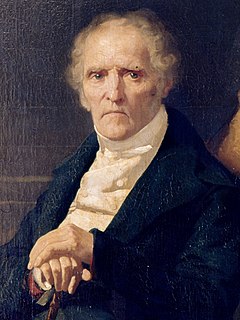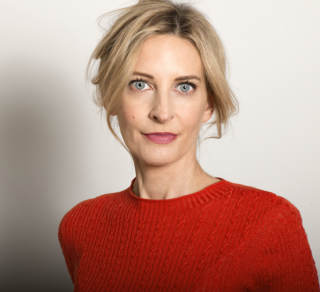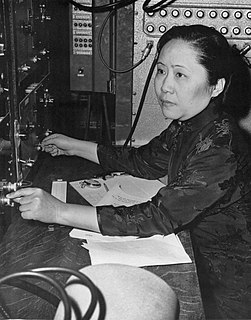A Quote by Naomi Alderman
Claude Cahun is a fascinating artist - one of the few women to be part of the surrealist movement, she and her partner Suzanne Malherbe took on men's names and made artworks that investigated female identity long before 'The Second Sex' or Cindy Sherman.
Related Quotes
[Cindy Sherman's] photographs reverse the terms of art and autobiography. They use art not to reveal the artist's true self but to show the self as an imaginary construct. There is no real Cindy Sherman in these photographs; there are only the guises she assumes. And she does not create these guises; she simply chooses them in the way that any of us do.
My youngest sister, Cindy, has Down syndrome, and I remember my mother spending hours and hours with her, teaching her to tie her shoelaces on her own, drilling multiplication tables with Cindy, practicing piano every day with her. No one expected Cindy to get a Ph.D.! But my mom wanted her to be the best she could be, within her limits.
People from pre-sexual revolution and even from the 60s and the birth of the gay movement still define gay as two men or two women having sex. Our generation defines it from a more emotional standpoint. To be gay means you are drawn to the same sex. But it's a part of who you are, an identity, not an act.
To confound the tyranny of man there should exist for a century a third sex, both male and female, and stronger than men. This new sex would prove with the lash that men as well as women are made for its pleasure; and then you would hear men protesting against the tyranny of the hermaphrodite sex and admitting that strength should not be the sole rule of right. Just why do they refuse to grant the women the independence which they would demand from the third sex?
I believe that all men and women are created equal, but it took our country until 1920 to acknowledge this for women. And then it took until 1964, the year before I was born, to outlaw discrimination based on race, color, religion, sex, or national origin. And same-sex marriage became the law of the land in 2015.
This is a culture of female display. And the reason it's a culture of female display is that on the Upper East Side women far outnumber men, if you do the sex ratios. I can't say exactly what they are, but you could google it. People have said two to one. So, it's a female display culture because sex ratios are skewed toward men, and they sort of have their choice, even if they're married.... Also, women are economically dependent on men, and so there's that aspect of needing to perform your beauty and your scarcity.
Ideally there should not be a men's movement but a gender transition movement; only the power of the women's movement necessitates the temporary corrective of a men's movement. And this creates a special challenge for men: There are few political movements filled with healthy people, yet few healthy changes have occurred without political movements.
When the feminist movement was at its zenith in the late 60's and early 70's, there was a lot of moving away from the idea of the person. It was: let's talk about the ideas behind the work, and the people matter less. It was kind of a gimmicky thing, but lots of feminist women were doing it. Many of us took the names of our female ancestors - bell hooks is my maternal great grandmother - to honor them and debunk the notion that we were these unique, exceptional women. We wanted to say, actually, we were the products of the women who'd gone before us.
She bent her finger and then straightened it. The mystery was in the instant before it moved, the dividing moment between not moving and moving, when her intention took effect. It was like a wave breaking. If she could only find herself at the crest, she thought, she might find the secret of herself, that part of her that was really in charge. She brought her forefinger closer to her face and stared at it, urging it to move. It remained still because she was pretending... . And when she did crook it finally, the action seemed to start in the finger itself, not in some part of her mind.
It is shameful that there are so few women in science. [...] In China there are many, many women in physics. There is a misconception in America that women scientists are all dowdy spinsters. This is the fault of men. In Chinese society, a woman is valued for what she is, and men encourage her to accomplishments yet she remains eternally feminine.
He had been to see Mrs. Erlich just before starting home for the holidays, and found her making German Christmas cakes. She took him into the kitchen and explained the almost holy traditions that governed this complicated cookery. Her excitement and seriousness as she beat and stirred were very pretty, Claude thought. She told off on her fingers the many ingredients, but he believed there were things she did not name: the fragrance of old friendships, the glow of early memories, belief in wonder-working rhymes and songs.
At the very last moment, just before its lips claimed hers, its grip on her face relaxed slightly and she did the only thing she could think of: She head-butted it. Snapped her head back, then forward again, and bashed it square in the face as hard as she could. So hard, in fact, that it made her woozy and gave her an instant migraine, making her wonder how Jean-Claude Van Damme always managed to coolly continue fighting after such a stunt. Obviously, movies lied.
The world taught women nothing skillful and then said her work was valueless. It permitted her no opinions and said she did not know how to think. It forbade her to speak in public and said the sex had no orators. It denied her the schools, and said the sex had no genius. It robbed her of every vestige of responsibility, and then called her weak. It taught her that every pleasure must come as a favor from men and when, to gain it, she decked herself in paint and fine feathers, as she had been taught to do, it called her vain.
If women had power, what would men be but women who can't bear children? And what would women be but men who can?" "Hah!" went Tenar; and presently, with some cunning, she said, "Haven't there been queens? Weren't they women of power?" "A queen's only a she-king," said Ged. She snorted. "I mean, men give her power. They let her use their power. But it isn't hers, is it? It isn't because she's a woman that she's powerful, but despite it.







































